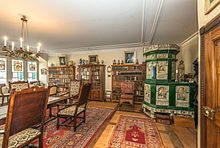House of the Goldener Leuen
The Haus zum Goldenen Leuen in Diessenhofen ( Canton Thurgau , Switzerland ) houses a private collection of rarities and curiosities, compiled by three generations of the Brunner family of pharmacists . Today the collection is administered by the Goldenen Leuen Foundation . The collection can be viewed.
House
The "Haus zum Goldenen Leuen" ("Leu" is Swiss for lion ) is probably one of the oldest houses in Diessenhofen. However, it was rebuilt several times over the centuries, so that no medieval parts can be recognized. In 1685 the house was almost completely rebuilt. Modifications and extensions were carried out in the 18th century and around 1900. The facade was renewed in 1981. It has been owned by the Brunner family since 1884.
Brunner family
The Brunner family can be traced back to the ancestor Gerardus des Ayons, who settled in Switzerland because of his Protestant faith. The wealthy trader changed his foreign name to Erhard Brunner in 1610 and was soon known as "Erhard the shopkeeper". His son became mayor of the town and thus anchored the family in their new home. The office of mayor remained in the family for the next two generations. In the third generation, the first of the Brunner family took up the medical profession and founded the Brunner medical dynasty, which was to last for four generations. Johann Conrad Brunner made a name for himself as a scientist and physician, his research work on the “large gastric gland”, the pancreas , is still today under the term “Brunner's glands”. He became known across national borders, became a personal physician at various courts and was raised to the nobility in 1711.
The dynasty of doctors ended with Jonas (V.) Brunner, he became a pharmacist like sons and sons-in-law of the following four generations. His son Jonas Friedrich Brunner (1821–1898) played a key role in founding the pharmacy association. In 1884 he acquired the "Haus zum Goldenen Leuen". He was a collector of works of art and books and founded the private library . His son Alfred Brunner (1861–1943) shared his father's passion and profession, he brought all the treasures to light and set up the “Haus zum Goldenen Leuen” with them. His children also share a passion for collecting. Erwin Brunner (1892–1963) was the last of the collectors; like his father and grandfather, he never did this out of financial concerns; it was never considered to resell purchased treasures. Even if collecting ended in the following generation, Erwin Brunner passed on his enthusiasm to witnesses of the past to his daughters. Regula Schmid-Brunner married a pharmacist who took over the Brunner Pharmacy for a year, but then sold it. Regula Schmid-Brunner and her husband Hans Werner Schmid took care of the many treasures in the “Haus zum Goldenen Leuen”. In 1975 they founded the Golden Leuen Foundation with the aim of preserving the collection as a whole.
collection
It consists of art and local history objects. Among other things, it includes: pewter collections mainly from southern Germany, a seal collection , coats of arms , guild and pub signs , numerous components and fittings, equipment and weapons , sacred objects, a private library and an "old pharmacy". The objects in the collection were recorded by the art historian Cornelia Stäheli from 1991 to 1993. The inventory that she created comprises twelve volumes with around 2000 objects recorded in pictures and text.
"Old pharmacy"
The “old pharmacy” deserves a special mention. Every time the Brunner family's pharmacy was renovated, the furniture, equipment and objects were kept and finally assembled by Alfred Brunner on the third floor of the Haus zum Goldenen Leuen to create a replica of an old pharmacy. There is a drug collection stored in an old medicine cabinet of a Dominican convent . The collection also includes animal and human skulls, prepared animals, shells and other curiosities.
Library
The private library occupies a room on the second floor of the “Haus zum Goldenen Leuen”. Today it comprises a good 3000 books on the subjects of pharmacy , chemistry , physics , botany , history and classical music . This also includes manuscripts and correspondence. The library also houses many special features such as handwritten records of special cases from some doctors in the region and a large collection of prescriptions, as well as the mushroom volumes by Jonas Friedrich Brunner, who laid the foundation stone for the library. For almost thirty years he searched for, described and drew mushrooms in watercolor , which he bound into books.
House chapel
Erwin Brunner set up a house chapel with the sacred art objects that he had collected over the years. These include statuettes of the Madonna, a valuable crucifix , reliquaries from the 18th century with fragments of bones from martyrs, incense lamps , vessels and baroque altars that come from the Diessenhofen church.
tin
The pewter collection includes several hundred pewter works, richly chased plates, guild cups, plates and individual items such as schnapps bottles with Jewish names.
Foundation, endowment
The “Foundation for the Golden Leuen” was founded in 1975 by Regula Dorothea Schmid-Brunner and Hans Werner Schmid. Its aim is to preserve the collection as a whole and to maintain and preserve the “Haus zum Goldenen Leuen” with all its objects.
Web links
Individual evidence
- ^ Regula Dorothea Schmid-Brunner: Foundation for the Golden Leuen. Memorial. Diessenhofen 2012.
- ^ Alfons Raimann: The Diessenhofen district. Wiese, Basel 1990 (= Die Kunstdenkmäler der Schweiz, 85).
- ↑ a b The passion of a dynasty. In: Aerztekasse Journal 87, August (25), pp. 16-21.
Coordinates: 47 ° 41 '21.8 " N , 8 ° 44' 59.9" E ; CH1903: 698451 / 282908


